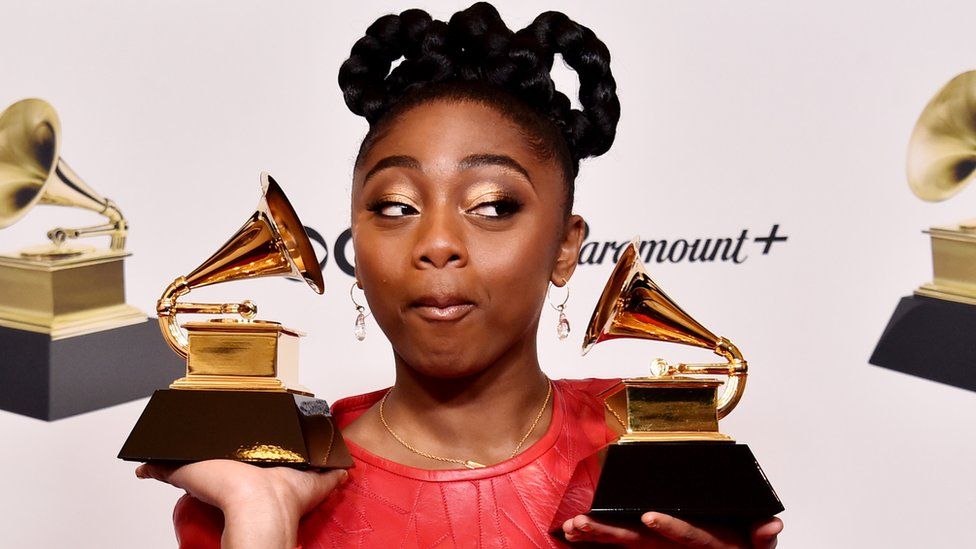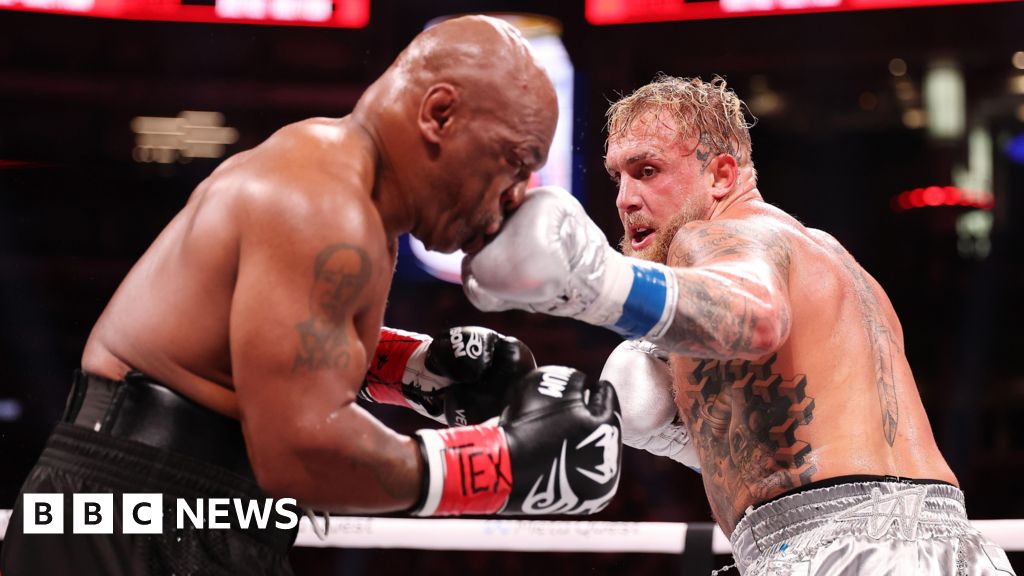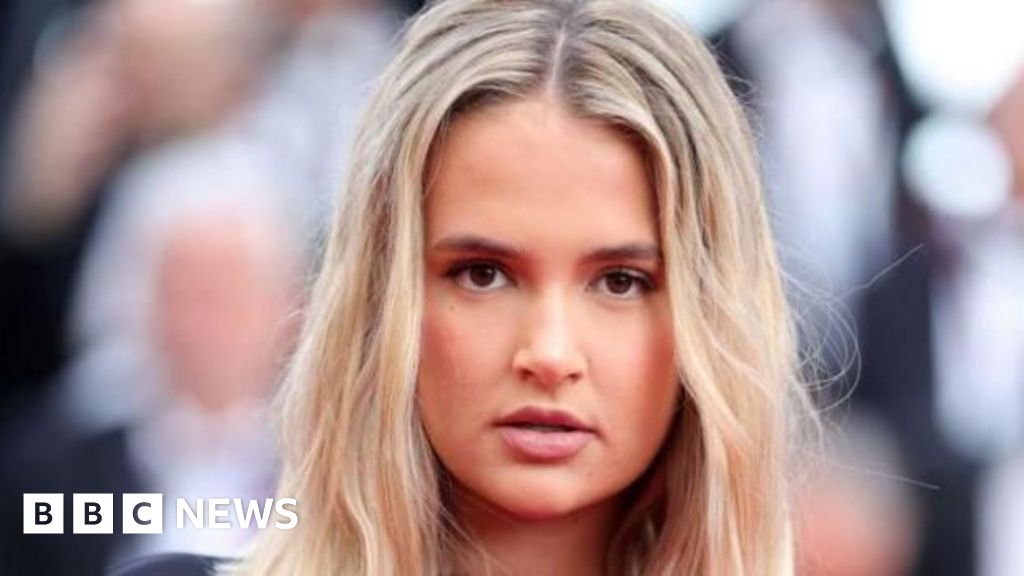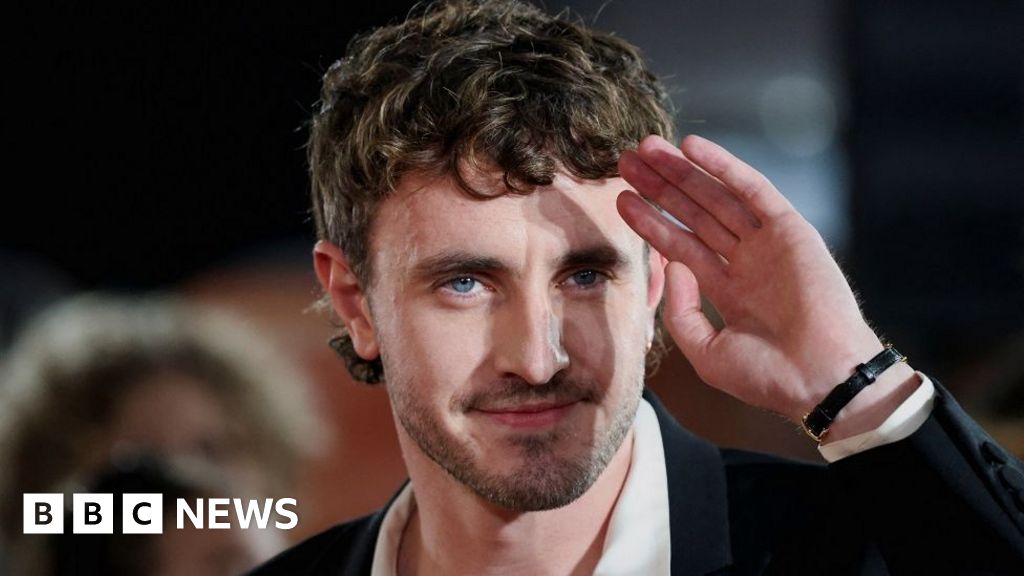ARTICLE AD BOX
 Image source, Getty Images
Image source, Getty Images
Joy's velvety-smooth alto recalls the golden era of jazz vocalists
By Mark Savage
BBC Music Correspondent
When Samara Joy sings, the world stands still. Tension vanishes, shoulders relax, serenity seems within reach.
The 23-year-old has a sound that's both timeless and fresh, blending old-school jazz crooning with the R&B vocalists she grew up on.
She's not a household name yet, but those who know, know.
And last month, the Grammys gave her the ultimate seal of approval - awarding her best jazz vocal album and, more significantly, best new artist.
Recent winners of the latter prize include household names like Billie Eilish and Olivia Rodrigo. To win, Joy had to beat chart regulars like Latto, Måneskin and Wet Leg.
Speaking in London a month after the ceremony, she recalls the moment Rodrigo opened the envelope and read her name.
"My eyes were closed and I was holding my little brother's hand; and when she said my name it was like, 'Oh shoot, oh shoot, oh shoot!'
"All these people stood up for me, Adele, Lizzo, Taylor Swift... so I was completely flushed, completely humbled."
But when she got to the stage, a chilling realisation set in.
"I'd left my phone behind," she laughs, "so my whole speech was just sitting at the table!"
After bashfully improvising her thank-yous, the night improved immeasurably.
"Beyoncé told me congratulations after the show, which was ridiculous. Me in the same room as Beyonce? And her knowing of my existence? It's just crazy."
Image source, Getty Images
Image caption,The singer says she only avoided crying over the best new artist title because she'd "already done all my crying" after winning best jazz album earlier in the night
By this stage, however, Joy should be accustomed to receiving honours.
Although she only took up jazz five years ago, she's already won the Sarah Vaughan International Jazz Vocal Competition, and been awarded the Ella Fitzgerald Memorial Scholarship.
Her voice is warm and mellifluous, lingering over notes like she's savouring wine, and simmering with emotional intensity.
She credits some of that to her producer/manager, Matt Pierson, who told her to "pretend as though a microphone is the person's ear that's listening to you".
But she also possesses an innate ability to take an old standard and make it seem like the lyrics were torn from her diary.
It's an approach that causes confusion for fans who aren't well versed in the jazz repertoire.
"People are like, 'I love your song, Guess Who I Saw Today?' And I'm like, 'I wish it was mine!" she says of her most recent single, originally made famous by Nancy Wilson.
"Others are like, 'Wow, I didn't know about that song before and it's a really great story'. I find it amazing that people connect with it."
Warning: Third party content may contain adverts
Born Samara Joy McLendon, the singer grew up in the Bronx, New York, in a sheltered, church-centric household.
"My parents were very protective. My dad picked us up and dropped us at school, we went to church together, we didn't go to the mall, I didn't really hang out or anything like that."
A studious child, she devoured teen fiction ("the less popular, cheaper ones") and competed in codeathons with her school's computer science club.
But music was always around. Her paternal grandparents are Elder Goldwire and Ruth McLendon, who formed one of Philadelphia's most prominent gospel outfits, The Savettes; and her father was a bass player who toured with gospel icon Andraé Crouch.
Joy tried the bass, too, but it was singing that truly fascinated her.
"I used to have an iPod Nano and my dad would upload music for me. I can remember listening to Lalah Hathaway, Jill Scott, Stevie Wonder... and I also loved the Disney Channel songs. High School Musical? That's me."
As she listened, she would pick apart details like phrasing, timbre and vibrato, exploring what made one singer different to another.
"I would try to copy every little thing and make sure that I really paid attention."
Image source, Samara Joy / Instagram
Image caption,The singer was surrounded by music from childhood
By the time she was 16, she'd been chosen to lead worship at her local church, at three services every week, for two years. The experience changed her forever.
"It basically taught me how to overcome being nervous, but it also helped me realise that the performance wasn't all about me.
"In church, it's like, 'We came to connect to something greater than ourselves'. So if I'm the vessel for that, then I have to be completely free of any sort of ego or nerves. That's what I still keep with me now."
Hooked on jazz
Her first exposure to jazz came at high school, where she performed "contemporary, fusion-y stuff" with a jazz band, but gospel was her focus until she enrolled in college.
Even then, she chose SUNY Purchase's acclaimed jazz programme, more for its proximity to home than the chance to study with jazz masters like Pasquale Grasso and drummer Kenny Washington (both of whom appeared on her debut album).
"I remember the first day, being so confused and feeling left behind," she says, "but it turned out to be the best thing for me."
When friends introduced her to Billie Holliday and Sarah Vaughan, she was "hooked", applying the same analytical approach to jazz that she'd practised on Disney soundtracks as a child.
"I was like, I'd never heard these women before. It was really an eye opener."
Encouraged by her professors, she won the prestigious Sarah Vaughan jazz competition in 2019, but her subsequent debut at the Newport Jazz Festival was abruptly dropped when the pandemic hit.
Instead, her big break came on Facebook.
Asked to record a "thank you" video for the benefactors who funded her scholarship, she filmed herself singing Ella Fitzgerald's Take Love Easy, accompanied by one of her professors.
Allow Facebook content?
This article contains content provided by Facebook. We ask for your permission before anything is loaded, as they may be using cookies and other technologies. You may want to read Meta’s Facebook cookie policy, external and privacy policy, external before accepting. To view this content choose ‘accept and continue’.
The BBC is not responsible for the content of external sites. Facebook content may contain adverts.
The following morning, the video had 4,000 views. Four days later, that had grown to a million, with Tony-Award-winner Audra McDonald among those praising her performance.
Seizing the opportunity, Joy set up a GoFundMe page, raising $8,000 (£6,500) to bankroll her debut album.
Recorded in two days and released by UK label Whirlwind Recordings, the self-titled LP won rave reviews for its smartly-chosen collection of jazz standards, which harked back to the golden era of interpretive vocalists of the 1930s-60s.
"I was really keen on focusing on songs that nobody else did, or that were really rare and that I could make my own," says the singer, who borrowed her approach from Cécile McLorin Salvant. ("She's got an incredible repertoire. The songs are so random but when she sings them, it all makes sense.")
Image source, Meredith Truax
Image caption,The singer is planning a tour with the rest of her family for the end of 2023
But touring the album made Joy realise she'd leaned too heavily on one aspect of her musical personality.
"Most of the songs [in my set] were kind of sad, so I wanted one that was about love, that wasn't too corny."
She settled on Can't Get Out Of This Mood, previously recorded by Frank Sinatra and Nina Simone, "about the jittery feeling you get when you're falling in love".
"It's very positive and uplifting. I was like, 'We can bring this into the set to break up all the misery!'"
That became the centrepiece of her Grammy-winning second album, Linger A While; alongside Guess Who I Saw Today - the story of an unfaithful partner, delivered with nail-biting narrative tension.
Warning: Third party content may contain adverts
Like her debut, Joy funded the recording herself before licensing it to historic jazz label Verve Recordings - evidence that her scholarship of the jazz greats extends beyond their music.
"I watched a lot of documentaries with my mom about how people in music get exploited, the background to artists' lives and navigating these business relationships," she confesses.
The resulting independence is shrewd: after the Grammys, the bidding war for her third album will be intense. But having experienced the glamour of "music's biggest night", she's cautious about fame.
"I saw a lot of celebrities that I've only ever seen online and I was like, 'Wow, you're real'. But at the same time, I don't want to be in their shoes.
"To be looked at and put on a pedestal? It looks hard.
"So I'm like, 'I'm cool, I'm cool. I'll go back home, I'll ride the subway, I'll walk the streets and just be normal."

 1 year ago
92
1 year ago
92








 English (US)
English (US)